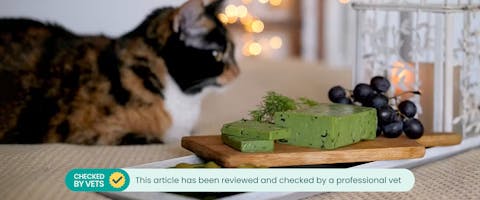Updated 21/09/2023
Whipped up into a tasty tapenade, baked into some olive bread - not to mention, they’re a real crowd pleaser on any charcuterie board.
Ok, olives can be a bit ‘love ‘em or hate them’. But if you’re proudly in ‘Team Olive’, you may be wondering this: can cats eat olives, or are olives poisonous to cats? And for that matter, why do cats seem so weirdly obsessed with these small, little fruits?
Well, turns out the answer is a little more complicated than first thought. Let’s dive in…
Trending posts
Purr-use some of the top blogs our members have been loving this month- Top male dog names for your new furry friendGot a new furry family member in your pack? Check…

- Top female dog names for your new fluffy palWelcoming a new pooch into your family? Explore…

- 250+ gray cat names your silver feline will loveRecently welcomed a fluffy gray bundle of joy into…

- What are normal pet sitting rates?Discover the average pet sitting rates for animals…

- Unique dog names to stand out from the packDare to be different with our list of the best…

Can cats eat olives?
It’s no secret that a Mediterranean diet holds a plethora of health benefits for us humans. It's reported to lower the chance of cardiovascular disease, it can support healthy weight loss and ageing, and may even help us live longer. But can popular Mediterranean food staples, like olives, harness the same health benefits for cats? And more importantly, are olives safe for cats?
Technically, yes. Olives are safe for cats to eat - as long as they are unsalted, unseasoned, completely plain, and given in very small amounts (we're talking less than a whole olive at a time here). That said, there are some caveats...
Are olives safe for cats?
The main concern with olives is that they are very high in sodium.
In small quantities, this could cause your kitty to suffer from stomach pain, vomiting and/or diarrhea. But in worse cases, too much salt could lead to sodium poisoning, which could be fatal. It could also be very harmful for cats with underlying conditions such as kidney disease and heart disease.
Unfortunately, the health hazards don't end there. Pitted olives pose a choking hazard to cats, not to mention most brands of pre-packed olives come either soaked in salty brine or either seasoned or stuffed with other foods (such as garlic) that are toxic to cats. Olives in oil can also be fatty, which could cause an upset tummy in our feline friends.
Essentially, it's really not worth the hassle. Safety concerns aside, olives don't provide cats with any nutritional benefits and on the whole, are considered to be empty calories.
Symptoms of sodium poisoning
Sodium toxicity is no joke. Here are some of the main signs of sodium poisoning in cats:
- Vomiting
- Diarrhea
- Thirst or dehydration
- Loss of appetite
- Constipation
- Excessive urination
- Seizures and tremoring
Sodium poisoning can lead to chronic kidney disease and can be fatal, so it’s important that you contact your vet as soon as possible if you suspect your kitty may have sodium poisoning.
Why do cats love olives?
Ok - we couldn’t write a whole article about cats and olives without broaching this topic. If they’re nutritionally void and pose a number of safety concerns, why oh why do cats seem so obsessed with olives?
Well, experts believe it's all down to a chemical compound found in olives that's very similar to the chemical compound (nepetalactone) found in catnip.
Apparently, cats can get the same feelings of euphoria from olives (particularly green olives) that they do from a good ol' bag of catnip. Which certainly explains why your kitty may start acting a bit silly and wild whenever you crack open the olive jar. Who knew?
Meet our veterinary expert, Aisling
This article has been checked by veterinarian Aisling O’Keeffe MVB CertSAM ISFMCertAdvFB. Aisling qualified as a vet 7 years ago from University College Dublin. She has worked in a mixture of UK small animal hospitals along with Irish practices. She worked for 3 years in a feline-only hospital where she further developed her feline medicine and surgery skills. She currently lives and works in a small animal hospital in Cork, Ireland.
Other foods that are not safe for cats
To be on the safe side, then, you should probably keep olives off your kitty’s next charcuterie board. Luckily, there’s always catnip!
But what else can and can’t cats eat? The list is (almost) endless, but to get you started, here are a few food items that cats should definitely avoid eating:

